Late Night Read: What was Avatar's cultural impact?
Jamie Lauren Keiles explores the mystery of the vanishing blockbuster
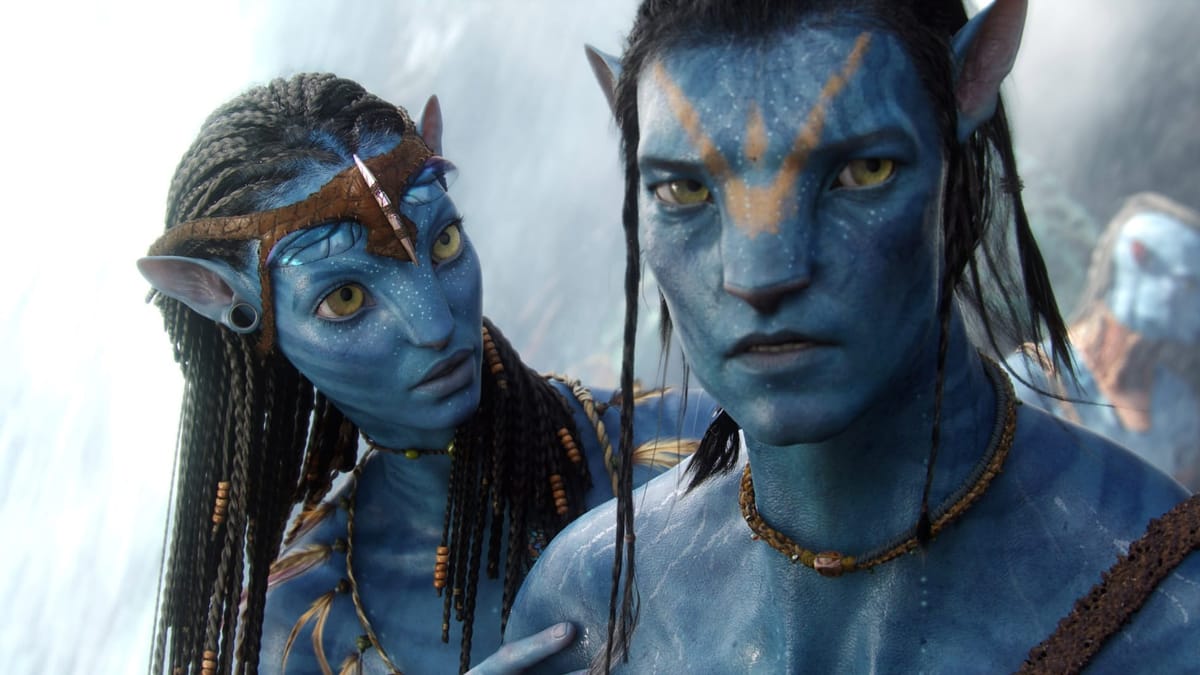
It’s late. You’re three Millers deep at the bar. You’re listening to smooth jazz in your study. You’re hibernating on a six-year journey to the moon Pandora. No matter where you are, you need something to look at on your phone. Enter: the Night Water Late Night Read.
Thirteen years ago, I plopped into a seat at the Plaza Movieplex 9 in Rutland, Vermont, to watch Avatar. It was a shitty little theater with uncomfortable seats and grimy floors and disgustingly salty popcorn (though to the theater’s credit, that may be more attributable to my dad than their popcorn recipe). But Avatar legitimately made that all disappear. It was my first time seeing a 3D movie (outside of a theme park), and the effects were like nothing I’d ever seen before. It was totally engrossing, and all that anyone I knew who’d seen it could talk about for days afterward.
But in the years since, hardly anyone talked about Avatar, and if they did, it was to point out that the highest-grossing film of all time seemed to leave absolutely no cultural impact. Where were the catchphrases, the iconic moments, the merchandising?
It’s a question that Jaime Lauren Keiles sets to answer on the eve of the premiere of the first of four planned sequels to Avatar scheduled to be released over the next decade.¹ Keiles points out that the answer may have less to do with Avatar and more to do with the culture it supposedly failed to impact. The year before Avatar came out, Marvel released Iron Man, the first film in what became the Marvel Cinematic Universe.
As “Avatar” promised one future for film — original world building, envelope-pushing effects, the theater as the site of cinematic innovation — Marvel, and other endeavors that would follow, went on to develop a very different one… According to data from Franchise Entertainment Research, in 2019, franchise movies made up 42 percent of Hollywood’s new wide releases and accounted for 83 percent of global box-office proceeds. The ascent of this networked form of entertainment has had far-reaching cultural effects on everything from the tone and plot structure of movies, to what it means to be a fan, to how we calculate success. If “Avatar” feels irrelevant today, it has less to do with the film itself and more to do with how the world has changed around it.
A big part of that change? Business, baby! While Keiles is hardly a fan of the movie, in their view, Avatar wasn’t meant to be a singular artistic expression of the bleeding edge of technology, it was meant to be a blueprint for a completely different kind of filmmaking than what we have today.
Today, 3-D is niche (at best); digital effects are used to cut costs; home streaming is threatening the theater; and projects of ambitious world-building are overlooked in favor of stories with existing fanbases. We did not get here by pure chance: The Telecommunications Act of 1996 deregulated broadcast media, allowing companies to form megaconglomerates. In this world of mergers and acquisitions, the franchise blossomed into a highly efficacious product, allowing companies to maximize intellectual property across their numerous platforms. As the economy grew more financialized, and even movie studios began behaving more like banks — promising profits quarter over quarter — the franchise product became even more appealing. Because franchises have a ready audience, they effectively functioned as a way to manage risk, allowing companies to bet bigger and win bigger.
The same month that the first Avatar was released, the Plaza Movieplex 9 was purchased by Flagship Cinemas, who replaced the seats but not much else. Just over a decade later, the theater closed permanently during the COVID-19 pandemic. The closest multiplex where a Rutland County citizen could see Avatar: The Way of Water this week is over an hour away.
Like the Marvel Cinematic Universe and Star Wars mega-franchises, the newly-burgeoning Avatar franchise is now owned by Disney thanks to their purchase of 20th Century Fox in 2019. Whether they’ll be able to fit an idiosyncratic, $200 million version of Dances With Wolves into their cookie-cutter creative model remains to be seen.
Read Keiles’ full story on Avatar over at the New York Times Magazine—I estimate that will take you around 20 to 25 minutes to read and that it will be well worth your time. Keiles is one of the best culture writers working today—I routinely return to their 2019 profile of Adam Sandler—and if you don’t read it, you’ll miss out on some very funny descriptions of the Avatar theme park at Disney World.
Unlike Keiles, I am fully Avatar-pilled and raring to go see Avatar: The Way of Water this Friday. My friends cannot tell if this is a bit or completely serious but are prepared to support me either way. In honor of the release, here are a few of my favorite tweets about Avatar over the last couple of weeks:
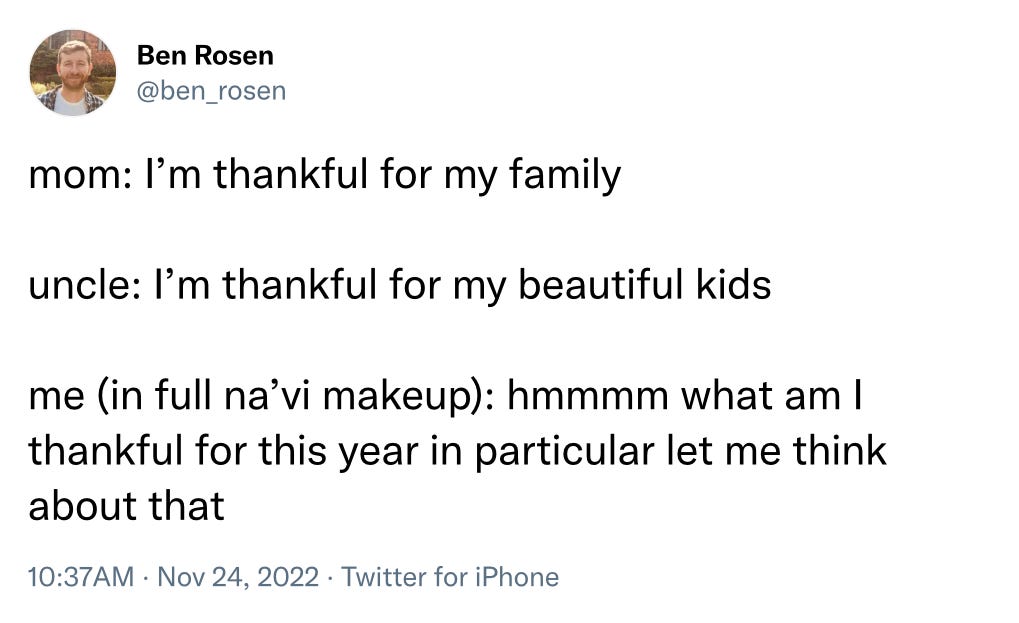
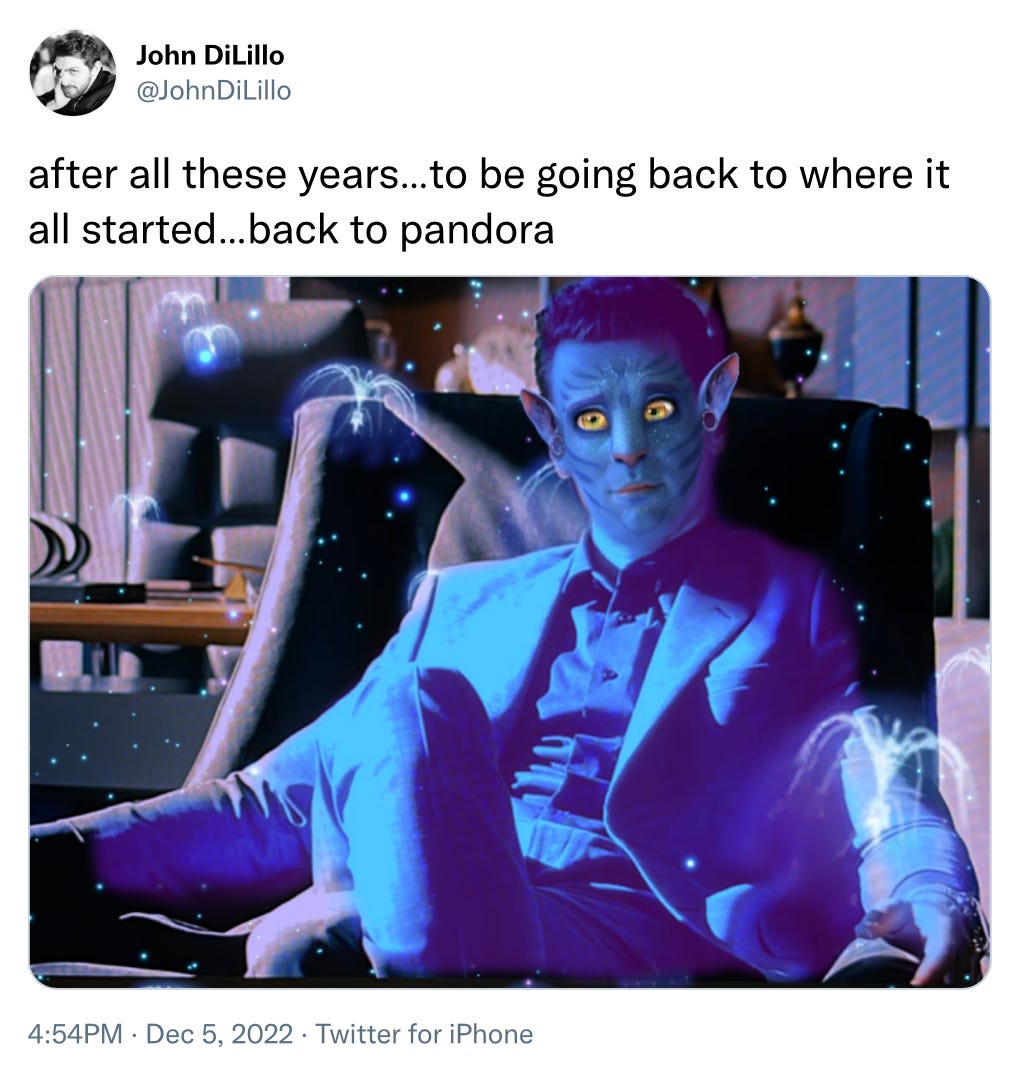
![Tweet from @sullenfish. "[last 10 years] haw haw James Cameron no wants to see more granola blue cats [avatar 2 comes out] I will follow James Cameron to into the Mariana Trench and defend him from all aggressors be they human or beast"](https://www.nightwater.email/content/images/2024/01/https-3a-2f-2fbucketeer-e05bbc84-baa3-437e-9518-adb32be77984-s3-amazonaws-com-2fpublic-2fimages-2f742375de-01bf-4497-ab6b-c3caeed36f32_1019x567-png.jpg)
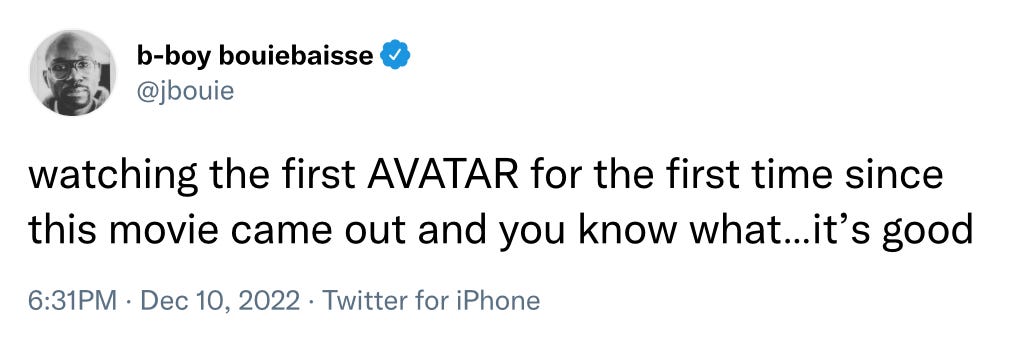
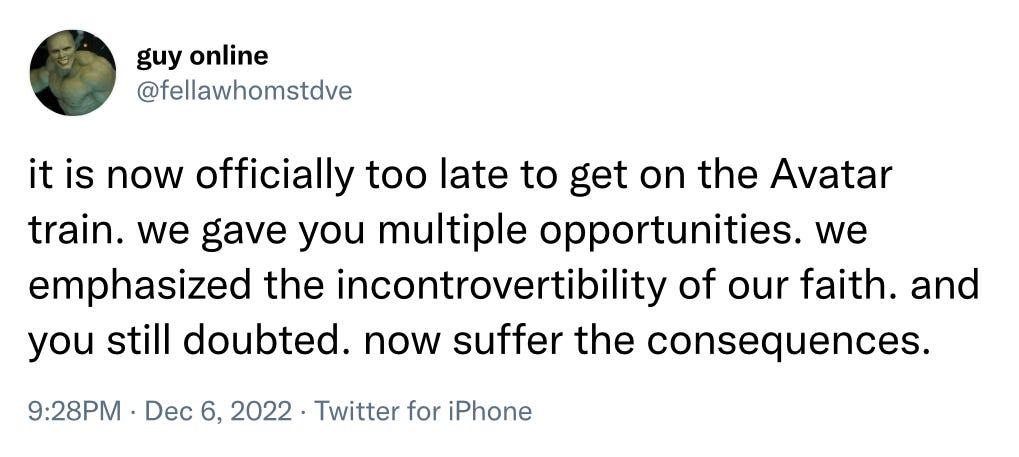

James Cameron recently stated he also has plans for a sixth and seventh Avatar film if the previous four movies do well. ↩




